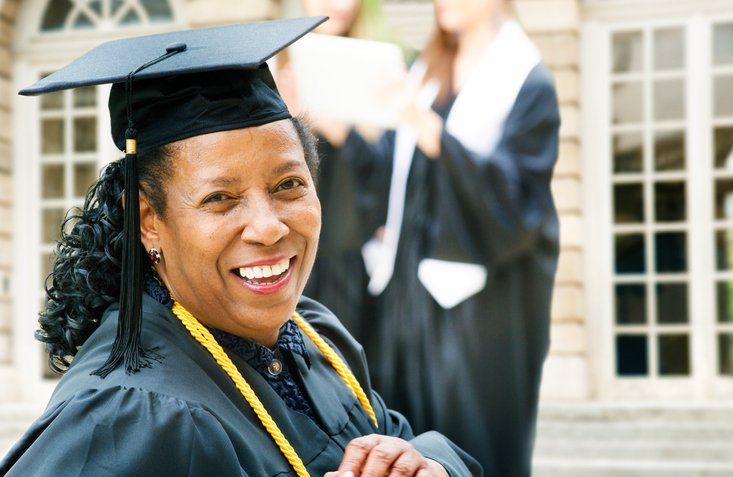
It felt like someone physically punched me in the gut. Hearing the words “you’ll have to go back and collect more data” from my Faculty Member brought on an overwhelming flood of emotions and a reminder of the financial pain yet another expense on my doctoral journey would bring. I was about 95% complete in my 4½ year PhD pursuit, and as I sat in this latest avalanche of self-doubt, exhaustion, and burnout, it was the first time I truly contemplated giving up. Can I do this? Why am I doing this? Will this all be worth it?
Hearing the words 'you’ll have to collect more data' brought a flood of emotions and another expense on my doctoral journey would bring. Can I do this? Why am I doing this? Will this all be worth it? Share on XWhen we look at the headlines, the data shows that the number of adults pursuing and earning advanced degrees in the U.S. continues to grow, particularly among Black women. The 2021 education attainment data released by the U.S. Census Bureau indicated that 14.3% of U.S. adults had advanced degrees, which is up from 10.9% in 2011. More specifically, according to a recent study conducted by The Journal of Blacks in Higher Education, among Black students completing higher education degrees, Black women earned more than 60% of doctoral degrees, 70% of master’s degrees, and approximately 66% of bachelor’s degrees at the 30 highest ranking universities in the United States. The benefits touted for embarking on such endeavors often involve the appeal for higher earnings and lower unemployment rates (Bureau of Labor Statistics, 2021).
Considering the story the data tells, then, it begs the question: Why am I pursuing my doctorate? As a Black woman, do I really want to be among the 2% of the U.S. population that has a Ph.D.? To answer this question, it was my family, my village and my tribe of dynamic Doctoral Divas that provided the light out of my moment of doctoral darkness.
Why am I pursuing my doctorate? As a Black woman, do I really want to be among the 2% of the U.S. population that has a PhD? Share on XWhy pursue a Doctoral degree?
The U.S. data depicts a numerical representation of educational achievement, but it does not shed light on why Black women are pursuing advanced degrees, and especially doctorate degrees. For example, my initial why was to open doors of opportunity needed as a single mom, and to provide validation to organizations that needed justification for giving me a seat at the leadership table. But now I am an empty-nester and an entrepreneur. My daughter is proud of me even without a PhD and I am now at the head of my company’s leadership table. Since the motivations have changed, and as I weigh exactly what that means for my future, I reached out to my circle of amazing Black women who have been where I currently am to understand what their why was for pursuing a doctoral degree.
The reasons I heard from others were rarely about the benefits of higher earnings and lower unemployment. They were about becoming a subject matter expert in their field, educational excellence, personal reasons and legacy. These Black women have become subject matter experts of organizational culture, leadership, business transformation and counseling in order to conduct research and apply it within their professional and entrepreneurial spaces. For example, Dr. Cresha Wilson, a Human Resource Professional in the Washington, DC area stated, “I am passionate about organizational culture and making all employees feel valued at work, especially marginalized groups. Also, in order to be respected as a knowledgeable Talent and Culture professional, I felt I needed an advanced degree for buy-in from older, senior leaders.”
Dr. Theodora Phillip, President & Founder of TAP Consultants, LLC in the U.S. Virgin Islands, echoed this perspective of an advanced degree minimizing barriers and increasing access to spaces within organizations or in entrepreneurial pursuits. “I pursued a doctoral degree to lend towards my credibility in future attempts to transition from an employee to the designation of being self-employed. Being self-employed would undoubtedly provide me with unmatched flexibilities as well as increased opportunities throughout various realms of business,” stated Dr. Phillip.
While the advanced degree may not have been required within their field, some of the underlying reasons cited for attaining it also lay in advocacy, giving back to their communities and removing barriers to increase access to previously untapped opportunities. Dr. Sherlonda Adkins, a clinician, speaker, success coach and entrepreneur in South Carolina, explained, “The degree wasn’t necessary to advance in clinical practice, but there are some arenas such as academia and medical science liaisons that require a doctoral degree. I am open to how my career evolves and not having educational limitations was important to me.” She also added, “I believed having more credentials would only aid me in getting a seat at the tables of interest, particularly regarding advancing in leadership to advocate for my profession and patients.”
Giving back to one’s community and believing in something bigger than oneself starts within the family. It was interesting to learn that obtaining a doctorate was part of the fabric of these women’s family life, from the examples set by their parents or the desire of the women to set an example for their children. It was definitely a personal journey of faith, family, and having the confidence to go after their dreams. “Both my parents are PhDs which is one motivating factor; however the main motivator, me being a woman of God, led me to go this direction. I honestly did not think this would be my path, but I feel I was called to take this journey,” stated Dr. Shirley Terrell, PCC, CPBA, I/O Psychologist and Executive Coach in Virginia.
The why for these women reminded me to look at my own family and, more specifically, to my sister Dr. Khnuma Simmonds, who was also on this doctoral journey, in lockstep with me as we completed our coursework, successfully passed our comprehensive exams, and were sifting through the dissertation process. She shares, “Our family has always instilled a spirit of education and excellence including the common discussion around ‘doing better than the previous generation.’ As the daughter of two educators and master’s degree holders, ‘better’ meant obtaining a PhD based on the highest level of education in my field. Thus, my inspiration was both of academic excellence and family legacy.” Khnuma is the CEO and Founder of the global movement Girlfriendism™, and a darling boutique in the U.S. Virgin Islands, My Girlfriend’s Closet, is building on the legacy of our ancestors and elders. She is birthing and leading women’s empowerment initiatives through the arts, entrepreneurship and social innovation.
The why of my beautiful circle of Doctoral Divas was also my why. Their words of encouragement and support gave me the loving embrace of uplifting, tenacious and resilient energy to not give up, to not quit, but to keep going until I become Dr. Xaulanda. But let’s be real…in the back of my mind, I was still asking: Once I’m done, will it all be worth it?
A doctoral degree: How did it change your life?
The feeling of accomplishing a goal that you have diligently worked on for years, made numerous sacrifices for and shed many tears over, truly makes you feel like you can conquer the world. As I look forward to savoring that feeling in the next few weeks, I wanted to know the “real deal” from the perspective of Black women that obtained their doctoral degree, some as recently as a few weeks ago. So I asked them, and this is what they shared:
“It may be too soon to tell, as my PhD is ‘hot off the press’ (lol). However, there has been a sense of pride and congratulations amongst family, friends and colleagues which demonstrates a level of appreciation and respect for the journey. My family calls me ‘Dr.’ even when I’m not used to it myself. My friends sent and continue to send prayers and well wishes. My collaborators are eager to update my credentials and share that they have a doctor on their team! (Now it would be nice to see the earnings increase too… but I digress!) I feel a personal sense of accomplishment having contributed to a body of research on Caribbean women in the U.S. Virgin Islands that were minimal to non-existent prior to my journey.” (2022)
“I have done a LOT since graduating a year ago (consulting, coaching, independent contracting as a clinician, speaking, traveling, writing, etc.) but I don’t believe it was a result of my degree. I do believe the name ‘Dr. Adkins’ has helped provide credibility quicker in some spaces where people didn’t already know me but it’s my innate drive, continuous curiosity, innovation and connecting with a coach that have been the keys to the new opportunities and success. It took some getting used to being referred to as ‘Dr. Adkins,’ particularly as a PA where in some places it’s frowned upon to refer to a PA as ‘Dr.’ However, I proudly use, say and write my full title!” (2021)
“Since it has only been two years, I am still uncertain on how the PhD changed my life. However, I have met some great individuals/fellow learners as a result of the process. I am now more educated and the topics I researched just highlighted my passion about creating an inclusive environment. I have received some opportunities as a result of my education and look forward to more opportunities in the future.” (2020)
“Professionally it has opened doors of opportunities in my career, my business, and academia. I am considered a SME in the field of I/O, coaching, and leadership development. Others are confident in my expertise.” (2020)
“Acquiring a doctoral degree solidified my footing as a contributor in certain arenas. I was afforded opportunities to present my thoughts, formed alliances, and collaborate on specific projects. [These are] opportunities I feel would not have materialized had it not been for that designation. Four years in, I am not sure it has changed my [trajectory] career wise; it has however provided me with the confidence to pursue my dreams of self-employment.” (2017)
The accomplishment of one is an accomplishment for all – the family, the village, the world and especially other Black women. The stories of how the pursuit of this audacious goal will change lives are still being written, but the impact these women are having in their respective spaces as well as the ripple effect that is being created cannot only be quantified in the statistics. Their stories tell so much more! What is certain is that the doctoral journey has solidified a sense of self, family, service, and legacy among these powerful women and others that have come before me.
So, if they had to do it all over again, would they?
The overwhelming and short answer: Yes! While the pursuit of a doctoral degree entailed a lot of hard work, sacrifice, pitfalls and aggravations, it gave way to a sense of pride, triumph over tribulations and self-discovery. Dr. Sherlonda shared, “it’s a reflection of my pursuit of excellence, knowledge and evolution.”
Likewise, Dr. Khnuma shared, “the lessons learned about myself in the process – as it pertains to discipline, patience, persistence, potential, grit, self-worth and self-understanding (just to name a few) – are lessons that I wouldn’t trade as a result of this journey.”
The educational attainment data will tell us the number of advanced degrees earned and, as justification to pursue a doctorate, try to correlate it with higher earnings and lower unemployment. But the story behind the numbers sheds light on the why. Why are Black women pursuing doctorate degrees?
The data will tell us the number of advanced degrees earned and correlate it with higher earnings. But the story behind the numbers sheds light on the why. Why are Black women pursuing doctorate degrees? Share on XThe Bob Marley and the Wailers song “Who Feels It (Knows It)” comes to mind for me in closing: it connotes a shared understanding among those who are moving through a journey that requires a heavy lift to accomplish. Dr. Khnuma shared, “I don’t believe in happenstance, and I don’t think it’s by chance that my sister and I are the first in our family to achieve this milestone together.” (Yep, that’s me!) I will add that it is not by chance that our circle of girlfriends comprises of Black women who have and are pursuing doctoral degrees.
I thank these dynamic Black women for sharing their stories, for reaching back to help me and others along this doctoral journey, and for the changes that they are making in their respective spaces that will benefit us all. From the perspective of the Black women that I know who have pursued doctorate degrees, it has been about becoming subject matter experts in our respective fields, educational excellence, personal reasons of family, faith, and community, as well as building a legacy for generations to come.
If you are a Black woman that has or is pursuing a doctorate degree, what’s your why?
Sources:
https://www.jbhe.com/news_views/51_gendergap_universities.html
https://www.bls.gov/careeroutlook/2022/data-on-display/education-pays.htm
https://worldpopulationreview.com/country-rankings/phd-percentage-by-country
https://www.census.gov/newsroom/press-releases/2022/educational-attainment.html


















